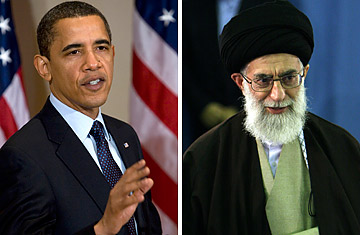
President Barack Obama and Iran's Supreme Leader Ayatullah Ali Khamenei
Barack Obama's Persian New Year message to the leaders and people of Iran appears to have had a significant impact in Tehran. That much was clear by the speed with which Iran's Supreme Leader, Ayatullah Ali Khamenei, responded. Obama's call for a "new beginning" was released early Friday morning, and Khamenei answered, unusually quickly, in a live televised address on Saturday that offered the most detailed response yet from Iran's leader to a series of rhetorical gestures from the new U.S. Administration. The essence of Khamenei's answer was that it would take more than "changes in words" from Washington to turn a new page in the relationship.
Khamenei said his regime would judge the Obama Administration by its actions rather than by the content of its speeches. And he made clear that as far as Tehran was concerned, Washington's actions remained hostile, despite the friendly words, emphasizing that Obama has reaffirmed U.S. sanctions against Iran. "They chant the slogan of change, but no change is seen in practice," he said. "We are observing, watching and judging. If you change, we will also change our behavior. If you do not change, we will be the same nation as 30 years ago [when Iranians overthrew the U.S.-backed Shah]." (See pictures of the long shadow of the Ayatullah Khomeini.)
The Ayatullah's haste to get an answer into the public realm, and the cold-water tone of that answer, may be aimed at a domestic audience, with the purpose of holding the line and preventing the new, more open U.S. posture from causing divisions within Iran's power structure. The fact that Khamenei emphasized Washington's continued "unconditional support" for Israel as among the examples of continued U.S. hostility underscores his domestic political intention. Previous diplomatic initiatives from Iran's leaders suggest that they don't seriously imagine that Washington will alter its support for Israel, but Khamenei, by citing one of the ideological pillars of the Islamic Revolution (hostility to "the Zionist regime"), was in effect admonishing Iranian leaders to keep the U.S. at arm's length. (The Supreme Leader's efforts to discredit the U.S. initiative by invoking Washington's ties with Israel could have been helped by Israeli President Shimon Peres' issuing a scolding New Year's message of his own to Iran's people hours after Obama's.) (See pictures of Iranian society, caught between tradition and modernity.)
In his message, Obama professed a commitment "to diplomacy that addresses the full range of issues before us, and to pursuing constructive ties among the United States, Iran and the international community" and called for an era of "engagement that is honest and grounded in mutual respect." By placing his overture in the call for a "grand bargain" that addresses all areas of conflict, and speaking of integrating Iran's current regime into a responsible role in the international community, the President expressed an openness to accommodating some of Tehran's key concerns. But Obama also emphasized that "terror and arms" did not fit with the responsibilities attached to Iran's resuming its rightful place in the community of nations.
Ayatullah Khamenei appears to have been well briefed on some of the thinking in the Obama Administration on how to handle negotiations with Iran. "For you to say that we will both talk to Iran and simultaneously exert pressure on her, both threats and appeasement — our nation hates this approach," Khamenei said. That, of course, is precisely what has been advocated by some key voices in Washington, most notably Dennis Ross, recently named the State Department's top adviser on Iran. Ross and others have strongly argued that imposing harsher penalties on Iran is the key to changing its behavior in the nuclear standoff but that those penalties should be tied to a diplomatic outreach that includes more incentives and allows Tehran to back down without being humiliated. (They've also argued that such outreach will help the U.S. win support from reluctant allies for harsher measures should Iran fail to respond positively.) So, even as Obama courts the Iranians with talk of a new relationship, the U.S. is keeping existing sanctions in place and moving to win support for sterner measures — for example, by offering concessions to Russia on other issues in order to win its cooperation in pressuring Tehran.
Khamenei appears to be signaling that he knows what Washington is up to — and that he has no intention of backing down. Thus the new diplomatic game between the U.S. and Iran: Neither side wants to negotiate from a position of weakness, which is why the U.S. is keeping in place, and trying to increase, its leverage in the form of economic pressure on Iran to desist from enriching uranium. But Iran sees the U.S. game plan and believes that Washington won't be able to muster the level of economic pressure necessary to force its hand — and the U.S. can hardly afford to initiate hostilities with the Islamic Republic, because it needs Iran's cooperation in Iraq and Afghanistan. A dialogue has clearly begun, but on current indications, that dialogue will — at least for now — remain just another theater in the ongoing battle of wills between the U.S. and Iran.
